As you know, almost nothing is given in our lives without the application of specific forceth and labor. The forty-day fast helps prepare for the holiday of Bright Easter, clean not only the body, but also your soul. Let's look at the peculiarities of the calendar of the Easter fast: when to start fasting, and when to finish, how to stick fast and what foods should be eaten.
The beginning and significance of the Lent
The forty-day fast before Easter is considered the most strict and important in the life of Orthodox Christians. During this period, believers need to manifest not only physical, but also spiritual abstinence from various worldly goods, filth and animal food.
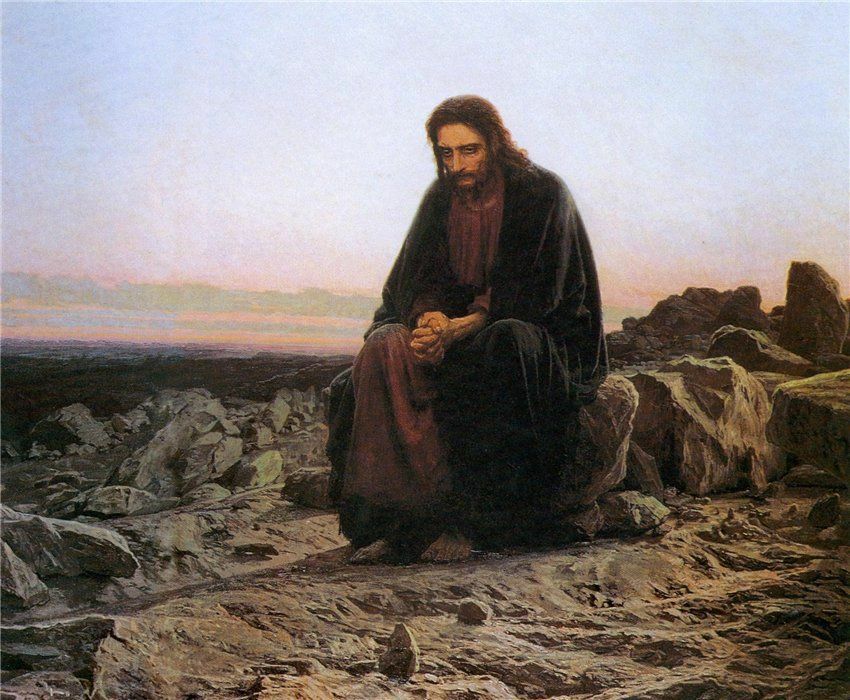
As the Holy Scriptures say, Jesus Christ was tempted for 40 days by the devil in the desert. Throughout the period presented, he drank nothing and did not eat. By fasting, we pay our respects to the suffering and the last days of Christ's life.
Let's first find out when the Easter post begins this year. We need this in order not to miss its beginning and in any case not to violate it.
Rules for food
As stated above, the strictest are the first week and the passionate week before Easter. On other days you need to eat according to the food calendar for the Easter post, which looks like this:
- Monday is dry. As the name implies, during this period you should eat only dry and thermally unprocessed food: bread, vegetables, greens, berries and fruits. As drinking drink water.
- Tuesday - on this day you can eat hot food made from vegetable ingredients without the use of oil. As a rule, these are vegetable soups and lean borsch.
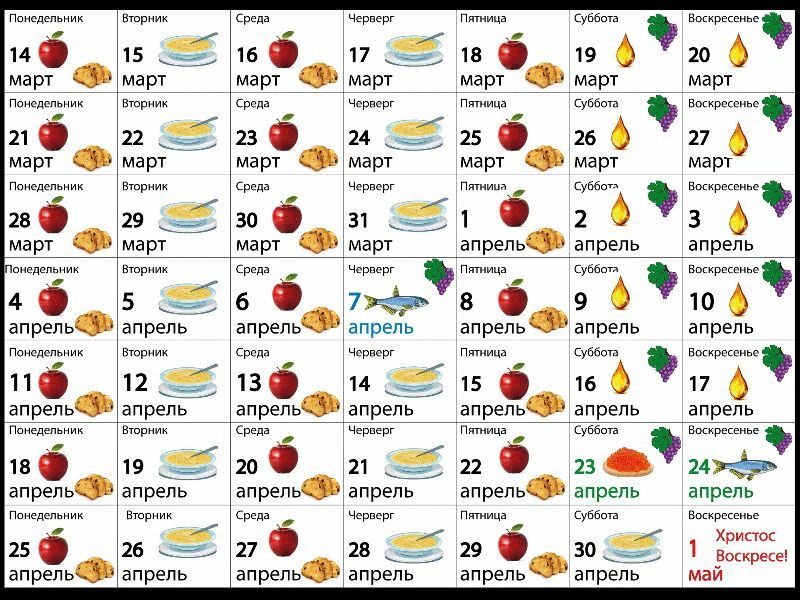
- Wednesday - as well as Monday, is devoted to dry thinking.
- Thursday is the consumption of hot food made from vegetable ingredients without the use of oil.
- Friday is dry.
- Saturday - this day allowed the use of vegetable food, prepared in lean oil.
- Sunday - as well as on Saturday, this day allowed vegetable food, cooked in lean oil.
There are also days when you can slightly change the menu. They concern certain Christian holidays. Among such days:
-
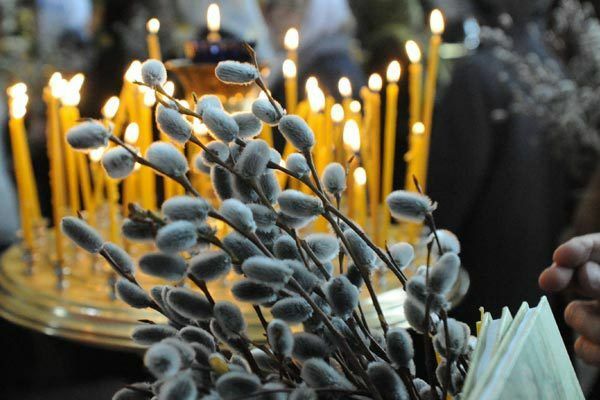 The Annunciation of the Blessed Virgin Mary( according to the Orthodox calendar, this holiday this year falls on April 7) - this day is allowed to eat low-fat varieties of fish.
The Annunciation of the Blessed Virgin Mary( according to the Orthodox calendar, this holiday this year falls on April 7) - this day is allowed to eat low-fat varieties of fish. - Palm Sunday( April 24) - the use of lean fish is also allowed.
- Lazareva Saturday( April 23) - Lenten menu can be diversified with fish caviar.
Please note that on Good Friday( April 29) you should not eat until the shroud is removed during the service. After that, you can eat only vegetables, greens and fruits.
Features of dry fasting in fasting
Most of the Easter fasting, believers observe dry eating, which implies eating without any sweets and vegetable oil. This food is dry and coarse, which makes it hard to eat. In addition, it is prepared without the use of any heat treatment.
Adhering to dryness, you can eat bread, various dried fruits( dried apricots, prunes, figs, dates, raisins, etc.) and nuts. Also in the diet can be present raw vegetables and fruits.
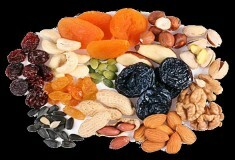 Dried fruits and nuts for dryness
Dried fruits and nuts for dryness 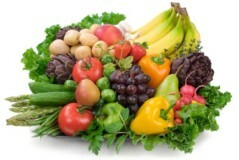 Fruits and vegetables
Fruits and vegetables 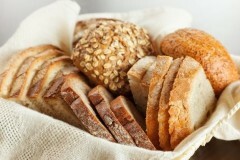 Lenten bread
Lenten bread As a rule, clergymen observe fasting during the Easter fast. The laity adhere to it on the first day of fasting, and also on Good Friday. However, quite often they also try to observe a strict fast and limit themselves in the usual food. Please note that before you begin a strict fast, it is recommended to ask the blessing of the priest.
Spiritual and physical cleansing
The dietary restriction in fasting before Easter promotes physical purification. The body gets rid of harmful toxins and toxins. Thus, fasting promotes health improvement, immunity improvement and energy accumulation. As a result, a person becomes stronger, healthier and more spirited.
- Within 40 days, since the beginning of the Easter fast, you can not swear, quarrel and swear. In addition, do not allow bad thoughts and envy.
-
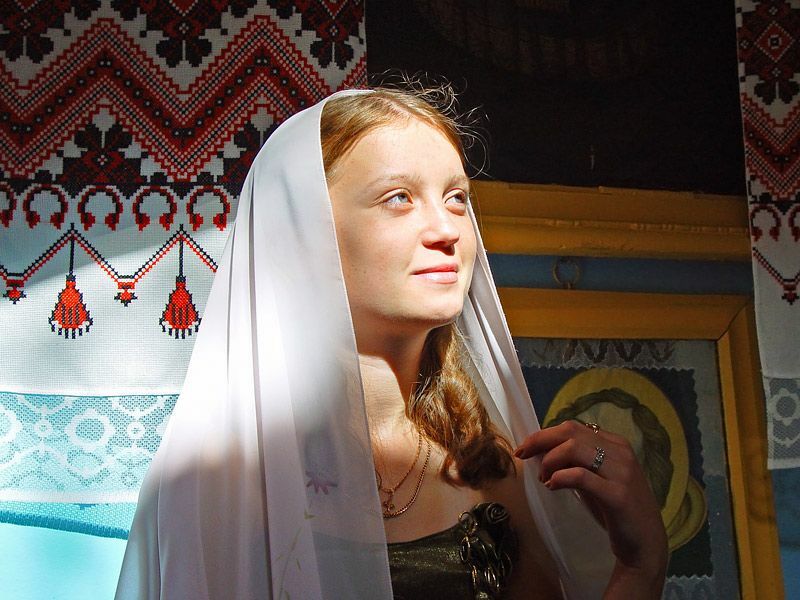 In the period of fasting, one should think about good things. Emphasize your efforts to purify and perfect your soul. During this time you can get rid of sinful thoughts, from various sins and evils. This period is mainly devoted to spiritual purification. Otherwise, fasting could be compared only with the usual diet and starvation.
In the period of fasting, one should think about good things. Emphasize your efforts to purify and perfect your soul. During this time you can get rid of sinful thoughts, from various sins and evils. This period is mainly devoted to spiritual purification. Otherwise, fasting could be compared only with the usual diet and starvation. - Thanks to the physical and spiritual cleansing achieved by fasting, a person gets the opportunity to get rid of the ailments, melancholy and sorrows that fill his body and soul. His spirit is purified, the person is tuned to a new positive mood and acquires the joy of life.
What you need and can not do while fasting
What you need to do during the post:
- Every day you need to start with a prayer. She also ends the day. If possible, it is necessary to attend the church, where one should also pray and ask God to purify the soul and strengthen the faith.
- Food should be necessarily lean and of vegetable origin. To consume it is necessary in such quantity that there was in the afternoon an easy feeling of hunger.
- On the first day of the Easter fast, you should completely refrain from food.
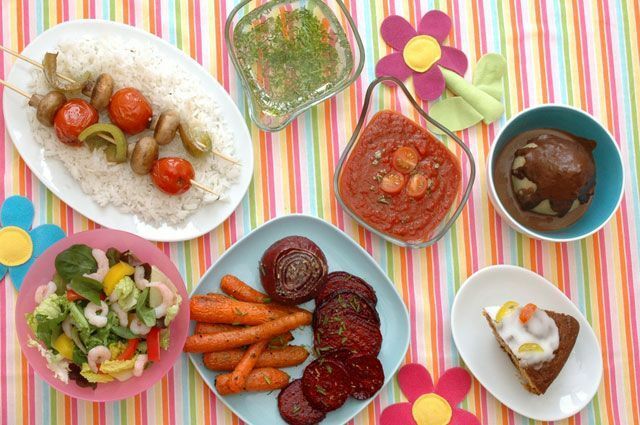
- Fasting is observed with extreme severity in the first and last weeks. At this time, food should be consumed at a minimum. She should not contain vegetable oil, nor any seasonings.
- During fasting, one should abide by abstinence. Husband and wife can only kiss each other in the evening.
- During the entire period of fasting, one should behave humbly to strengthen one's faith and spiritually develop oneself. The main thing in this is not to lose weight and improve your body, but get rid of sinful desires and thoughts about your own pleasure.
- During fasting, you should completely clear your thoughts and actions from negative, evil and sin. It is necessary to think about the good, try to forgive your relatives all their grievances, and also do good to others and help those in need. This is a special time when we are approaching Jesus Christ and are able to purify ourselves of all the bad things that are in us.
- At least once it is necessary to confess to the priest and receive communion. These religious rituals contribute to the purification of the soul.
- On Parent Saturdays, which this year fall on March 7, 14 and 21, one should visit the temple and put the candles behind the dead.
- In the period before Easter, you need to exercise moderation in eating. Even if you only eat vegetarian food, you should not eat it up to the dump, as this will no longer be considered fasting.
- It is necessary to give alms to beggars and help those in need. At the same time, you can ask them to pray for your health or for the peace of your deceased relatives.
- Good deeds should be done: help the elderly, feed birds and street animals, make donations, do not turn away from those people who ask for help, etc.
What is not or should not be done during the post:
-
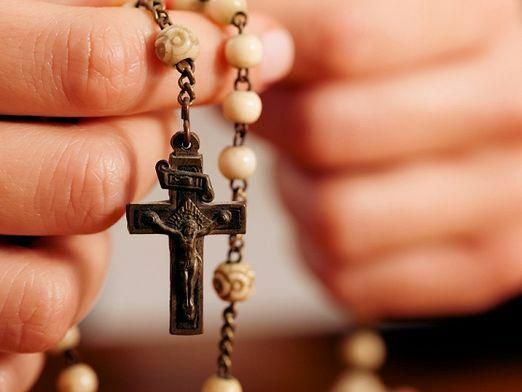 During the GreatEaster fasting should refrain from drinking alcoholic beverages, as well as visiting various entertainment and institutions( you should also limit visits to a cafe and a cinema).This is the time of rest and silence, reserved for the rethinking of their actions and life in general. Please note that on Saturday and Sunday a glass of red wine is allowed.
During the GreatEaster fasting should refrain from drinking alcoholic beverages, as well as visiting various entertainment and institutions( you should also limit visits to a cafe and a cinema).This is the time of rest and silence, reserved for the rethinking of their actions and life in general. Please note that on Saturday and Sunday a glass of red wine is allowed. - In no case can you swear, violate the commandments, surrender your conscience, gossip, pronounce indecent words and indulge in sin.
- You can not burden your body with a full stomach. It is necessary to observe the restriction in food in accordance with the Church's statute.
- It is prohibited during fasting to eat food of animal origin: poultry, meat and fish. The latter can only be used in strictly reserved days. In addition, eggs and sour-milk products are prohibited.
- You can not marry or marry during a fast. These events are recommended to be postponed to another, more appropriate time.
The first week of fasting
This year the post begins on March 14.The first Monday is called clean. On this day it is recommended to completely refrain from eating.
The first week of the Easter fast, along with the last is the strictest. Food can be taken only once a day. It must necessarily be dry.
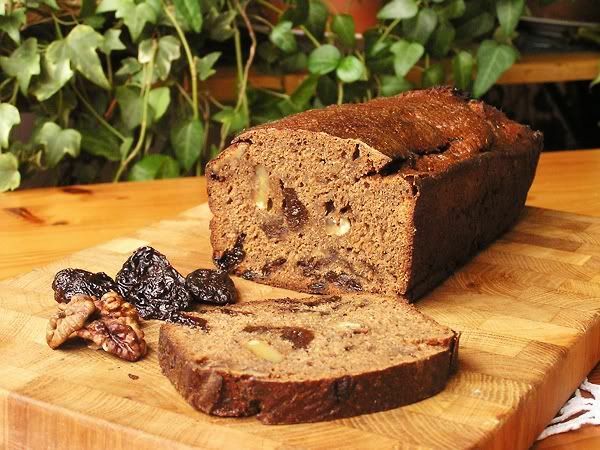 No hot dishes are allowed, let alone the use of fish or dishes cooked in vegetable oil.
No hot dishes are allowed, let alone the use of fish or dishes cooked in vegetable oil.
Note that the measure of abstinence from food is better to negotiate with your confessor. In addition, the presence of various chronic diseases associated with the gastrointestinal tract is also of great importance here. Fasting should go to man for good, and not to harm his health.
Most of the restrictions on food concern priests. Lay people at this time are allowed to cook food with a small amount of vegetable oil. During this period, you can not eat chocolate and various flour dishes. The only exception is lean baking.
Week 1 of Lent, repentance - says Metropolitan Kirill, video
Last week of fasting
Last week of the Easter fast, which is called Passionate, as well as the first, is very strict. It is allowed only dry eating, and on Good Friday it is generally recommended to stay away from eating food.
During this period it is necessary to behave modestly, quietly and calmly. It is not allowed even to sing, play musical instruments and dance, as well as attend various entertaining activities. Passionate week before Easter is necessary to lead in harmony with yourself, as well as in meditation on God and about your life.
Let's look at how to properly prepare for Easter in the last week of the post:
- On Great Monday, you need to carefully prepare your home for the holiday of Bright Easter. To do this, it is necessary to clean the house thoroughly, wash everything well, vacuum it, and, where necessary, paint it up.

- On Tuesday, you need to tidy your clothes: wash it, iron it, and where necessary - patch.
- On Wednesday, you need to complete all the housework: finish cleaning, take out all the garbage, etc. In addition, on this day it is recommended to begin preparation for making Easter eggs and Easter cakes.
- On Easter Thursday, Easter cakes begin to be cooked, to be made with a pure heart, faith and special trepidation. Before the baking process, you should pray to Jesus Christ, cleanse your body and soul. In addition, a large number of different rituals are associated with Pure Thursday. One of them is the purification of one's body. At dawn, you should take a bath, wash your hair and body well, thereby eliminating yourself from the negative and various ailments. Especially this ritual is recommended for children and sick people.
- On Good Friday, it is not recommended to eat or drink anything. In addition, on this day you should not listen to music, dance, sing, sew, erase or cut.
- On Easter Saturday begins preparation for the Easter meal. On this day, prepare dishes for the festive table, as well as paint eggs and make pysankas.
How to diversify the table during fasting
At first glance, food during the Easter fast seems very scarce. However, if you demonstrate the imagination and skill of the cook, you can well diversify your daily menu. Moreover, today there are a huge number of recipes for fast dishes.
The table can be varied with the following products and dishes:
- Various vegetables and fruits - both fresh and dried.
- Razasolami.
- Green and seeds of cereals.
- Honey and nuts.
 Lenten baking
Lenten baking 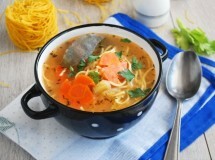 Fasting first courses
Fasting first courses 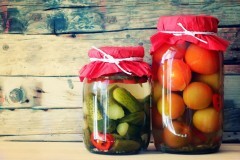 Marinades and pickles
Marinades and pickles - Various salads and vegetable dishes.
- Lent by baking.
- Macaroni.
- Mushrooms: fresh, boiled, dried, canned, etc.
- Vegetable soups and lean borsch.
Tasty and useful lean dishes
During a strict Easter fast, contrary to popular belief, you can cook many delicious and healthy dishes. Let's look at some interesting options:
-
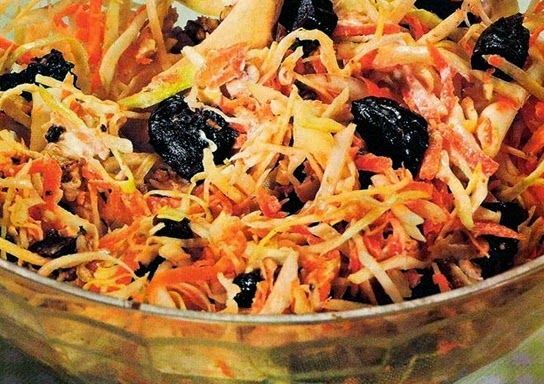 Salad with fresh cabbage and prunes. For its preparation, it is necessary to cut cabbage, fresh apple( it is desirable to choose sour-sweet varieties) and carrots with thin straws. Prunes are soaked in warm water, and after it swells, cut into strips and mixed with the rest of the ingredients. In the salad, add salt, sugar, and then season with lemon juice.
Salad with fresh cabbage and prunes. For its preparation, it is necessary to cut cabbage, fresh apple( it is desirable to choose sour-sweet varieties) and carrots with thin straws. Prunes are soaked in warm water, and after it swells, cut into strips and mixed with the rest of the ingredients. In the salad, add salt, sugar, and then season with lemon juice. - Pumpkin-apple salad. For its preparation, fresh apples and pumpkin rubbed on a large grater and mix well. Separately on a fine grater, rub horseradish and add to the rest of the ingredients. Then add sugar to the salad and season with lemon juice. On top decorate crushed fresh grated carrots.
- Banana salad. A few ripe bananas are cut into cubes, and then add to them nuts and a raisin well washed in warm water. Then the resulting vitamin mixture is carefully laid out on clean lettuce leaves and sprinkled with lemon zest.
Precautions
The Orthodox Easter post should be carefully followed by the following categories of people: 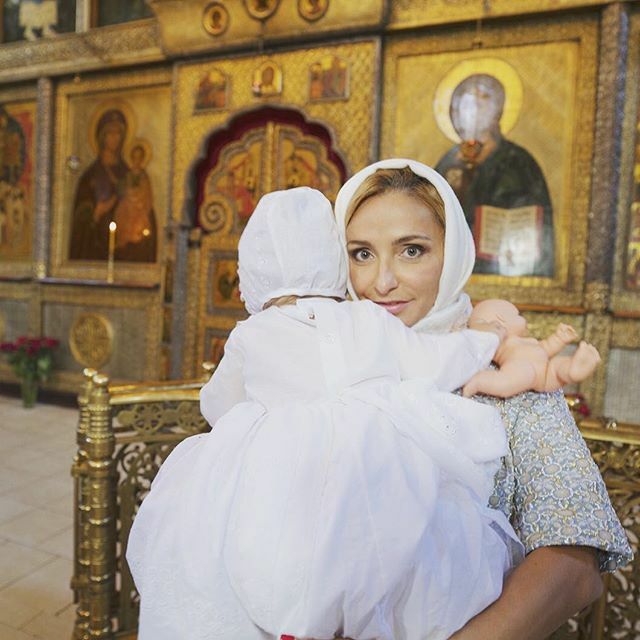
- Pregnant women.
- To the Elderly.
- For young children.
- Minors.
- To people suffering from chronic diseases.
- People who have problems with the endocrine system.
The aforementioned categories of people before observing fasting should consult their doctor and talk with the priest. The fact is that abstinence from meat, fish and milk dishes can be detrimental to health. In addition, the meaning of the Paschal fasting is not in the restriction of food, but in spiritual purification and the strengthening of one's faith.
Fasting is a personal matter for every believer. The Easter fast is compulsory for clergy, lay people can not follow it strictly.
Video:
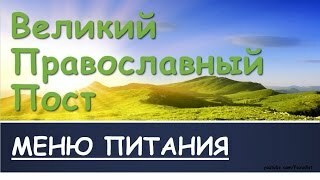 4:51
4:51 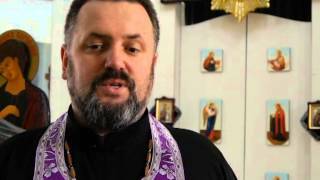 4:19
4:19  14:18
14:18 